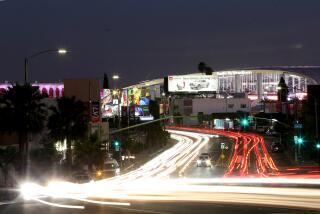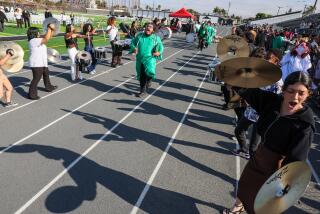Of Verdicts and Violence
- Share via
Hundreds of volunteer “peace ambassadors” are ready to flood the streets when a verdict is announced in the trial of a white Inglewood police officer videotaped body-slamming and punching a handcuffed black teenager. Church marquees and signs on shop windows call for peace after the verdict. Preachers have worked the message into their Sunday sermons and promise to open their doors to anyone wanting a safe place to talk. Block clubs and local radio talk shows are putting out the word to assemble at Inglewood City Hall for a public prayer vigil when the trial is over.
The video, shot by a bystander last summer and broadcast worldwide, inevitably recalls the notorious 1991 images of Los Angeles officers beating black motorist Rodney King. It’s a sad comment indeed that the first thought in preparing for the Inglewood verdict is that the city must preempt street violence.
The reaction demonstrates a lack of faith in both the court system and in the many people who would not resort to violence, no matter what the verdict. But city and community leaders have decided that they must be prepared to head off a few potential hotheads. Given the region’s history, it’s hard to argue with that pragmatism.
The Justice Department hails the broad-based effort as a nationwide example. The coalition of activists, church leaders, residents and business owners behind the peace-keeping efforts are determined to make Inglewood a model of restraint. In meetings over the last year, the Inglewood Peace and Fairness Coalition has brought officers into classrooms, community meeting halls and churches to talk about ways to improve the testy relationship between the police and the community.
As critical as better police relations are, coalition Chairman Kahlid Shah, who also is executive director of the anti-gang Stop the Violence, Increase the Peace Foundation, doesn’t want to quit there. He wants the 500 people who turned out to protest last year when the video of the white officer punching the black teenager first aired to do the same every time teenagers kill each other.
“It’s not the police killing them,” Shah says of the extraordinarily high homicide rates in predominately black neighborhoods in Inglewood and South Los Angeles. “It’s the young people killing each other. If we want to be outraged, then we have to be outraged with ourselves.”
Imagine if the Inglewood verdict were not the end of lobbying, preaching and marching for peace but the beginning.
More to Read
Sign up for Essential California
The most important California stories and recommendations in your inbox every morning.
You may occasionally receive promotional content from the Los Angeles Times.













